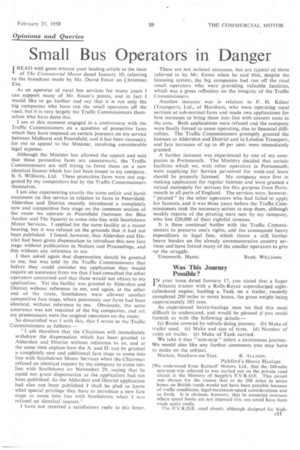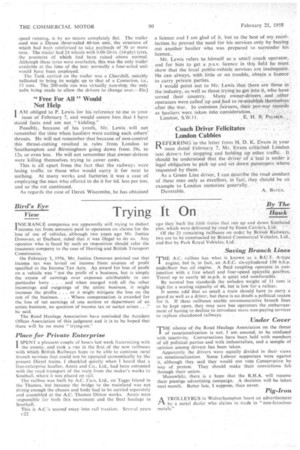Small Bus Operators in Danger
Page 59

Page 60

If you've noticed an error in this article please click here to report it so we can fix it.
I READ with great interest your leading article in the issue of The Commercial Motor dated January 10, referring to the broadcast made by Mr. David Ensor on Christmas Eve.
As an operator of rural bus services for many years I can support many of Mr. Ensor's points, and in fact I would like to go further and say that it is not only the big companies who have run the small operators off the road, but it is very largely the Traffic Commissioners themselves who have done this.
I am at this moment engaged in a controversy with the Traffic Commissioners on a question of protective fares which they have imposed on certain journeys on my service between Midhurst and Petersfield, and it has been necessary for me to appeal to the Minister, involving considerable legal expense.
Although the Minister has allowed the appeal and said that these protective fares are unnecessary, the Traffic Commissioners are still trying to force them on a new identical licence which has just been issued to my company. B. S. Williams, Ltd. These protective fares were not suggested by my competitors but by the Traffic Commissioners themselves.
I am also experiencing exactly the same unfair and harsh treatment on this service in relation to fares in Petersfield. Aldershot and District recently introduced a completely new and competitive fare stage on the common section of the route we operate in Petersfield (between the Blue Anchor and The Square) to come into line with Southdown Motor Services. I applied for the same facility at a recent hearing, but it was refused on the grounds that it had not been published. I found, however, that Aldershot and District had been given dispensation to introduce this new fare stage without publication in Notices and Proceedings, and this without any reference to me.
I then asked again that dispensation should be granted to me, but was told by the Traffic Commissioners that before they could consider my application they would require an assurance from me that I had consulted the other operators concerned and that these would not object to my application, Yet the facility was granted to Aldershot and District without reference to me, and again, at the other end of the route, Southdown were allowed another competitive fare stage, where previously our fares had been identical, without reference to me. Obviously, the same assurance was not required of the big companies, and yet my predecessors were the original operators on the route.
So dissatisfied was I with this, that I wrote to the Traffic Commissioners as follows:— " I ask therefore that the Chairman will immediately withdraw the dispensation which has been granted to Aldershot and District without reference to us, and at the same time explain how the A. and D. can be granted a completely new and additional fare stage to come into line with Southdown Motor Services when the Chairman refused an identical request by my company to come into line with Southdown on November 29, saying that he could not grant dispensation as the application had not been published. As the Aldershot and District application had also not been published I shall be glad to know what special privilege they have to introduce a new fare stage to come into line with Southdown when I was refused an identical request."
I have not received a satisfactory reply to this letter. These are not isolated instances, but are typical of those referred to by Mr. Ensor when he said that, despite the licensing system, the big companies had run off the road . small operator's who were providing valuable facilities, which was a gross reflection on the integrity of the Traffic Commissioners.
Another instance was in relation to F. H. Kilner (Transport), Ltd., of Horsham, who were operating rural services at sub-normal fares and made two applications for fare increases to bring them into line with current rates in the area. Both applications were refused and the company were finally forced to cease operating, due to financial difficulties. The Traffic Commissioners promptly granted the licences to Aldershot and District and to London Transport, and fare increases of up to 40 per cent, were immediately granted.
A further instance was experienced by one of my companies in Portsmouth. The Ministry decided that certain facilities which we, with other operators in Portsmouth, were supplying for Service personnel for week-end leave should be properly licensed. My company were first in making application for regular licences and were granted a virtual monopoly for services for this purpose from Portsmouth to all parts of England. The services were, however, " pirated " by the other operators who had failed to apply for licences, and it was three years before the Traffic Commissioners took the necessary action to stop them, although weekly reports of the pirating were sent by my Company, who lost £20,000 of their rightful revenue.
It is these continual battles with the Traffic Commissioners to preserve one's rights, and the consequent heavy expenditure in legal fees, which throw a still. further heavy burden on the already unremunerative country services and have forced many of the smaller operators to give up the struggle.
Etnsworth, Hants. BASH, WILLIAMS.
Was This Journey Possible?
IN your issue, dated January 17, you stated that a Super
Atlantic tractor with a Rolls-Royce supercharged eightcylindered engine,' hauling a Tank on a trailer, recently completed 200"miles in seven hours, the gross weight being approximately 103 tons.
As experienced heavy-haulage men we find this most difficult to understand, and would be pleased if you could furnish us with the following details:—
(a) Route covered by vehicle doing journey. (b) Make of trailer used. (c) Make and size of tyres. (d) Number of axles on trailer. (e) Make of Tank carried.
We take it that " non-stop " infers a continuous journey. We would also like any further comments you may have to make on the subject.
Norton, Stockton-on-Tees. R. ALLISON, Pickford's Heavy Haulage.. [We understand from Rotinoff Motors, Ltd., that the 200-mile non-stop trip referred to was carried out on the private road circuit at the Ministry of Supply's F.V.R.D.E. This circuit was chosen for the reason that to do 200 miles in seven hours on British roads would not have been possible because of traffic conditions, legal-maximum-speed considerations and so forth. It is obvious, however, that in countries overseas where speed limits are not imposed this run could have been made quite easily.
The F.V.R.D.E. road circuit, although designed for high
speed running, is by no means completely flat. The trailer used was a Dyson three-aided 40-ton unit, the structure of which had been reinforced' to take. payloads of 50 or more tons. The trailer had 24 wheels with 9.00-20-in, (14-ply) tyres, the pressures of which had been raised above normal. Although these tyres were overladen, this was the only trailer available at the time of the test: normally a four-axled unit would have been employed.
The Tank carried on the trailer was a Churchill, suitably ballasted to bring its weight ma to that of a Centurion, i.e., 53 tons. The 200-mile run was virtually non-stop, the only nalts being made to allow the drivers to change 'over.—ED.]
"Free For All" Would Not Help
I AM obliged to P. Lewis for his reference to me in your I issue of February 7, and would assure him that I have stated facts and am not " kidding."
Possibly, because of his youth, Mr. Lewis . will not remember, the time when hauliers were cutting each others' throats. He will not remember that because of non-control this throat-cutting resulted in rates from London to Southampton and Birmingham going down from 39s. to 12s. or even less. He will not remember that owner-drivers were killing themselves trying to cover costs.
This is all apart from the fact that the railways were losing traffic to those who would carry it for next to nothing. At many works and factories it was a case of employing the man who offered to do it for 6d. less per ton, and so the rot continued.
As regards the case of Derek Wiscombe, he has obtained a licence and .1 am glad of it, but to the best of my recollection he proved the need for his services only by buying out another haulier who was prepared to surrender his licence., Mr. Lewis refers to himself as a small coach operator, and for him to get a p.s.v. licence in thi, field he must show that the local public-vehicle services are inadequate. He can always, with little or no trouble, obtain a licence to carry private parties. . . •
would point out to Mr. Lewis that there are those in the industry, as well as those trying to get into it, who have served their country. Many owner-drivers and other operators were called up and had to re-establish themselves ,after the. war. In common fairness, their pre-war records as hauliers were taken into-consideration.
London, S.W.] 1. H. B. PALMER.
Coach Driver Felicitates Loudon Cabbies
REFERRING' to theletter from H. D. K. Evans in your issue dated February 7, Mr. Evans criticized London taxi drivers for stopping and holding up other traffic. It should be understood that the driver of a taxi is under a legal obligation to pick up and set down passengers where requested by them.
As a Green Line driver, I can describe the road conduct of these men only as excellent, in fact, they should be an example to London motorists generally.
Dunstable. A. BAILS.












































































































